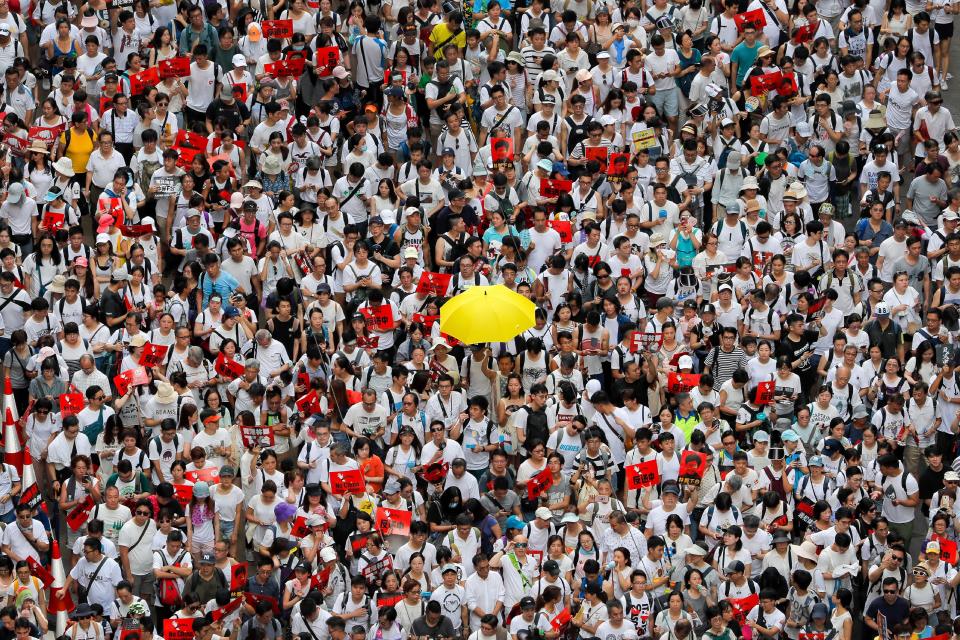Hong Kong braces for more protests as political pressure builds to delay or scrap extradition bill

As Hong Kong braces for another round of protests and street clashes on Friday, there were signs among the city's political leaders that the proposed extradition bill that has triggered strong opposition might be delayed, if not watered down.
After five days of protests, a brief calm set in on Friday, with major thoroughfares reopening. Another round of protests was planned later in the day, however, building to another major demonstration on Sunday organized by Civil Human Rights Front.
The controversial bill would allow fugitives in Hong Kong be extradited to mainland China, raising concern among critics that it would be used to undermine the city's civil liberties by making political activists and human rights activists subject to removal.
Supporters argued that the law was designed merely to keep Hong Kong from being a safe haven for criminals.
The former British colony of 7.5 millionwas formally transferred to in 1997 under an agreement guaranteeing its economic and political system for 50 years.
As the protests of unfolded this week, organizers said more than a million people had taken to the streets since demonstrators erupted on Sunday. On Wednesday, protesters surrounded the Legislative Council building, blocking lawmakers from meeting as scheduled to move the legislation toward a vote next week.
More: If Hong Kong extradition bill passes, what will happen?
In addition to opposition to the extradition bill, demonstrators added their outrage over police tactics during the protests.

Several groups circulated online petitions signed by tens of thousands of people objecting to use of rubber bullets, tear gas and other tactics during protests that left about 80 people injured.
Police arrested 11 protesters for illegal assembly, disorderly conduct, and other charges during the demonstrations, Hong Kong Police Commissioner Stephen Lo told reporters on Thursday. He said 22 officers were injured in the melee as protesters hurled bricks and planks at police.
Hundreds Hong Kong mothers, some holding signs with such messages as "Don't Shoot Our Kids," turned out Friday to protest the police reaction to demonstrators.
Amnesty International Hong Kong director Man-Kei Tam said the "ugly scenes" against "overwhelmingly peaceful protesters" was a "violation of international law."
"This excessive response from police is fueling tensions and is likely to contribute to worsening violence, rather than end it," Tam said in a statement.
Amid the mounting street pressure, some Hong Kong politicians appeared to be looking for ways to delay, if not scrap, the bill.
A group of former senior government officials issued a joint letter Friday urging Chief Executive Carrie Lam not to force a confrontation by pushing ahead with the unpopular legislation.
Some members of Lam’s Cabinet -- the Executive Council -- also have suggested she might want to reconsider the bills’ passage.
Willy Lam, an expert on Chinese politics at Chinese University of Hong Kong said Friday that Beijing-appointed Chief Executive Carrie Lam may have to compromise, the Associated Press reported..
Willy Lam said the pressure to amend the plan or step down comes from many sectors, including business leaders.
In addition, former Hong Kong Chief Secretary Anson Chan said the Hong Kong government should drop the bill outright.
Chan said in an interview Friday that Sunday's protest by hundreds of thousands of people showed “the Hong Kong spirit at its best,” the AP reported.
Chan, who served as head of the civil service under the former British colonial administration and the Chinese-installed leadership that succeeded it in 1997, said passage of the proposed legislation placed “everybody’s individual freedom and safety at risk.”
He said Carrie Lam appeared to have underestimated the degree of public dissatisfaction with the proposed legislation, which many see as part of a push to draw the city closer to Beijing.
So far, the Chinese leadership in Beijing has keep largely at arm's length over the bill, at least publicly.
"Handing over of these fugitives has certainly helped Hong Kong curb cross-boundary crimes and maintain its reputation as one of the safest cities in the world," said an editorial in China Daily, the Chinese communist Party's English-language newspaper.
"It is lawlessness that will hurt Hong Kong, not the proposed amendments to its fugitive law," the editorial said.
Foreign Ministry spokesman Geng Shuang, however, accused western politicians Friday of blatantly encouraging Hong Kong activists who have led the huge protests.
He added that all Chinese including the citizens of Hong Kong will surely oppose any attempts to create chaos in Hong Kong and undermine the city’s prosperity and stability.
Contributing: Associated Press
This article originally appeared on USA TODAY: Hong Kong braces for more protests as political pressure builds to delay or scrap extradition bill

